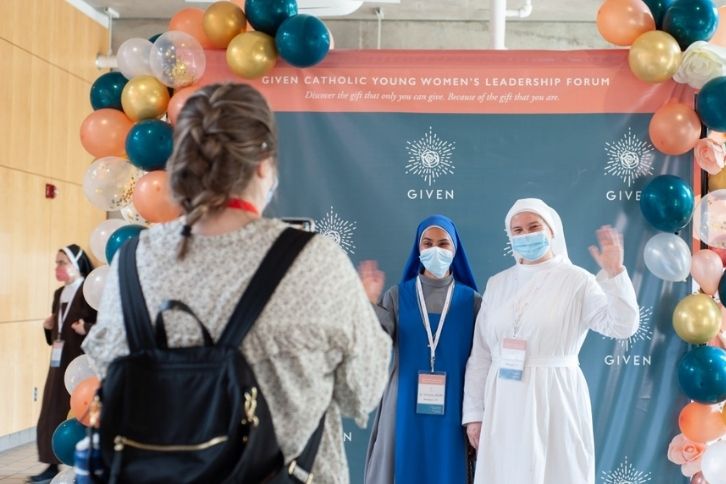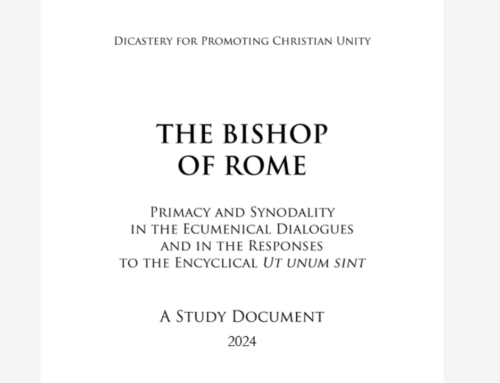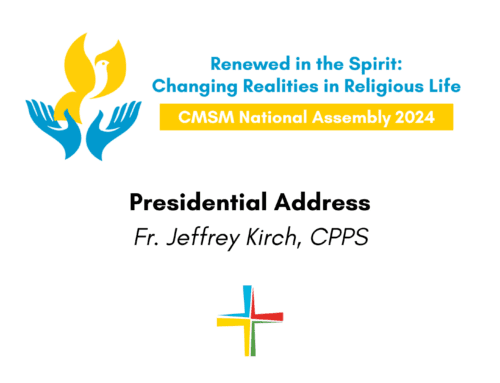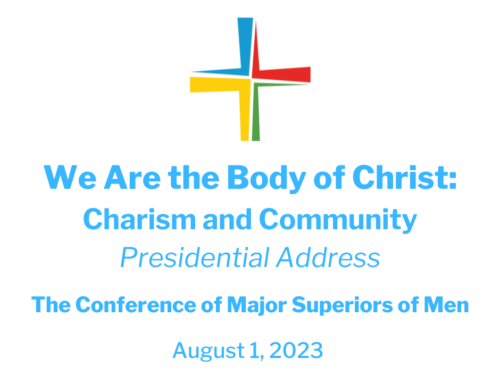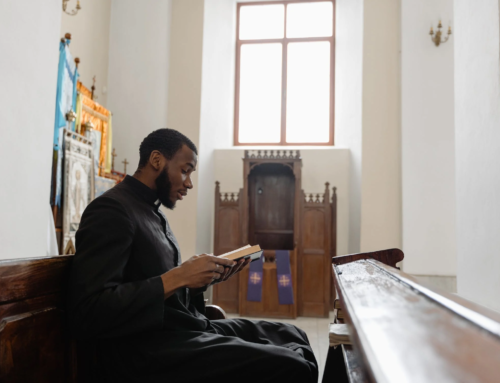Lindsey Weishar reflects on her experience at the GIVEN Institute’s Catholic Young Women’s Leadership Forum. She appreciatively notices the GIVEN Forum’s emphasis on the universal call to love, but also excavates the power, possibilities, and tensions of relationships across various states of life. Click here to download a copy of this essay.
Stepping into the Basilica of the Shrine of the Immaculate Conception for the opening mass, I encountered a veritable sea of women: 130 young women, 30 lay women mentors, and 55 religious sisters from 21 different orders. This was the commencement of the 2021 GIVEN Forum, held at the Catholic University of America from June 9th–13th. GIVEN, which invites young women (ages 21–30) to “discover the gift that only you can give” and to carry out an action plan which puts these gifts at the service of the Church, also invites lay women and sisters alike to discover the gift of each other. As its website highlights, GIVEN was founded by the Council of Major Superiors of Women Religious in 2016:
Mother Agnes Mary Donovan, Superior General of the Sisters of Life and an organizer of the event, said “GIVEN was conceived in the hearts of women religious and remains a significant response on the part of the Church to encourage, inspire, and mentor young women at a crucial moment in their lives. We want each of them to know they are loved, noticed, and necessary.”[1]
Five years later, the fruit of this desire is still being cultivated. I was one of the 130 young women at the 2021 Forum. Though I’ve been blessed to grow up around religious sisters, GIVEN presented me with a new way to understand cross-vocational relationships. I both felt and heard from young women and sisters alike that we’d never seen so many of us all in the same place. One sister marveled at seeing so many faithful young women ready to share their gifts with the world; another sister mentioned how beautiful it was to see the variety of religious orders present—Franciscans, Carmelites, Norbertines, Dominicans, Sisters of Life, Servants of the Lord and the Virgin of Matará, to name only some of the orders present. One young woman commented on the peace and joy of seeing the sisters, who she described as “little glimpses of Mary.” With so great a cloud of witnesses around us, we could not fail to be moved by each other.
I’ve been trying to think of an image to adequately illustrate what this immersion into the profundity of the feminine genius was like. I can do no better than GIVEN’s table décor—vases of roses. One afternoon, I noticed a particular vase in which there was a stunning trinity of red, white, and pink roses. In bringing us into each other’s presence, the GIVEN Forum was that vase, and Christ the nourishing water, bringing together so many roses—so many different ways of living out love.
The Joys and Challenges of Cross-Vocational Relationships
In bringing us into each other’s lives for five days, GIVEN has presented a vision of vocational unity I’ve only occasionally glimpsed elsewhere. I was struck by how we all fit together—sisters, single women, married women, consecrated virgins, as well as young, middle-aged, and elderly women. As Sr. Jeana Visel, a Sister of St. Benedict, shared, “We get fed by the wholeness of the Church.” And we did. At meals we sat together, talking about our lives and hopes and asking questions about each other’s lives. We were all fed together at Mass by our Eucharistic Lord, who, we were reminded throughout the retreat, comes to each of us personally, loves each of us individually, and guides each of us along a particular path.
When I consider cross-vocational unity, however, the difficulty I encounter as a single person is that being single is not traditionally considered a vocational stateAnd I’ve sometimes observed the gaps in relationship that occur because I’m not in the same vocational sphere as those around me. For example, I’m at a time in my life when many of my friends have gotten married and are having children. And this is beautiful. It also has required a shift in my relationship with my married friends. They are now more likely to seek out married couples for fellowship because we seek to grow in our vocation from those who are already on the path we have been called to follow. So, in a certain way, my access to my married friends has shifted because they’ve fully entered into the married vocation, which requires a reorientation of their lives’ focus.
For similar reasons, my access is also somewhat limited to those in religious life. They, too, have given a full-hearted yes to a particular vocation, a yes that requires them to live somewhat separately from lay people—to strengthen the bonds of community life and to spend time with Christ and communities in His Church in the particular way their charism calls them.
Finding Common Vocational Ground in the Universal Call to Love
And yet, post-conference, what’s resonating most is the fact that no matter what our state in life, we need to be surrounded by other vocations. To that desire, the GIVEN Forum has cast a vision for cross-vocational relationships that look different than a vocational discernment encounter at a convent or a singles ministry at a parish. Indeed, the focus for GIVEN was first and foremost on the universal vocation to love that we each uniquely witness to through our state in life and work. Instead of first asking “Am I called to marriage?” “Am I called to religious life?” I’m instead first asking, “How am I called to love?” “What gifts has God given me that I can give to the world?” “What vocational state might best allow me to give these gifts?” In presenting a more holistic way to consider one’s vocation, the founders of GIVEN have revealed vocation to be a much more multifaceted reality than I’d ever considered.
Reflecting on GIVEN’s founding in the hearts of religious women, it was heartening to experience that religious sisters see the potential to play a role in young women’s lives, to show us we are “loved, noticed, and necessary.”[2] I, in turn, wonder if there is a way for lay women to show sisters they are loved, noticed, and necessary, or if sisters receive this knowledge from their fellow sisters and the communities they serve. Can women of other states in life walk alongside sisters in ways similar to how they walked alongside us at the GIVEN Forum? And if so, what would this look like?
The answers are probably as various as the religious communities themselves. For example, one religious community I’ve encountered, The Little Brothers and Sisters of the Lamb, a French-based Dominican order founded in the early 1980s (with a location in Kansas City, KS), live a life centered on prayer and living out the Gospel message. They welcome into their charism the poor and “the Family of the Lamb,” which includes “lay single people, families, young adults, children, and diocesan priests.”[3] As a young adult who has experienced the friendship of this community, I’ve witnessed how they incorporate us into their prayer and work lives. They have a family-style dinner once a week to which young adults are particularly invited. Young adults are also regularly invited to help the order clean the monastery, and participate in rosary walks, neighborhood missions, walking pilgrimages, and night vigils. Most everything the Community invites young adults to are not vocational discernment-type experiences, but an invitation to share in community life—not as a professed religious, but as lay people, who have a place in this community’s mission.
Of course, not every order can easily incorporate young adults, and many orders already work alongside lay people in carrying out their daily work. The GIVEN Forum opened other possibilities for what cross-vocational relationship could look like. While throughout the conference we had spent time alongside sisters, entering into conversation during meals and within smaller mentoring groups, celebrating mass together, and even sharing in some recreation time together, the healing adoration night that took place on the last night of the conference further illuminated the sisters’ spiritual maternity. Young women were invited to come and pray with sisters, who formed prayer teams and placed their hands on our shoulders as they prayed and interceded for us. I witnessed so many young women seated between two sisters, who comforted, spoke with, and prayed for us, helping us to follow our own callings with greater freedom. The fact that, alongside the religious orders visibly present, 21 cloistered communities throughout the U.S. were also praying for us during the Forum beautifully reveals the impact of spiritual maternity—for many of us that night, the prayer of the sisters birthed new hope and renewed strength.
What Can Lay-Religious Collaboration Look Like?
In discerning what lay/religious collaboration may look like beyond GIVEN, it is important to remember that, in very real ways, our various states of life call us away from each other—to serve a family or a particular community, for instance. I knew in leaving GIVEN that some of the connections I made with sisters through GIVEN will only be able to be nourished through prayer, as opposed to visiting each other and growing in personal friendship. So, how can we practicably bring vocational spheres together and create cross-vocational relationships, without turning women away from the communities they are called to serve? As a single person living out my universal vocation to love, but not yet in a vocational state, the thirst for cross-vocational relationships is strong for me. I wonder, is it as strong for those who have already found this aspect of vocation? Every so often I stumble upon an article or story that promotes such relationships. For example, a number of years ago, I encountered an online article suggesting that married friends intentionally invite non-married friends to their home to share a meal. The goal is not necessarily to find matches for one’s single friends, but to promote fellowship among people in different parts of their
This happened very naturally at GIVEN. I think what made it possible was the location and the vision of the Forum. We all left home for the Forum, and for five days, we were at leisure to spend time with each other, which was the most precious gift I’ve personally taken from this experience. The goal of this Forum was to activate our gifts for the service of the Church, and it was something every single one of us could ask of the Lord, no matter what our state in life, because there is always something more to be given. And as we heard throughout the Forum, we are all called to be mothers—sometimes physically, but all of us spiritually, and this I think was another bond between us. Seeing the variety of ways in which a woman can express her maternity has made me hopeful that even I as a single person may have gifts that can nourish the life of a religious sister. Maybe through discovering and activating these gifts, I can help open up a conduit of encouragement to a sister. As a member of this body of Christ, I know my need for religious sisters, not only in the life of the Church but in my own individual life.
I think GIVEN offers a vision in which the cultivation of cross-vocational relationship is not only possible but is a living, vibrant reality. in the span on our lives, my hope is that as the fruit of this Forum continues to grow, we may be inspired in whatever state of life we are in to seek out opportunities to spend time with others who do not share our state in life. It is incredibly nourishing when we do.
(Header photo courtesy of Lisa Julia Photography.)
[1] “Leadership.” The GIVEN Institute, 2021, https://giveninstitute.com/leadership/.
[2] “Leadership.” The GIVEN Institute, 2021, https://giveninstitute.com/leadership/.
[3] “The Community of the Lamb.” Communauté de l’Agneau, 2021, https://www.communautedelagneau.org/en/la-communaute-de-l-agneau/.

